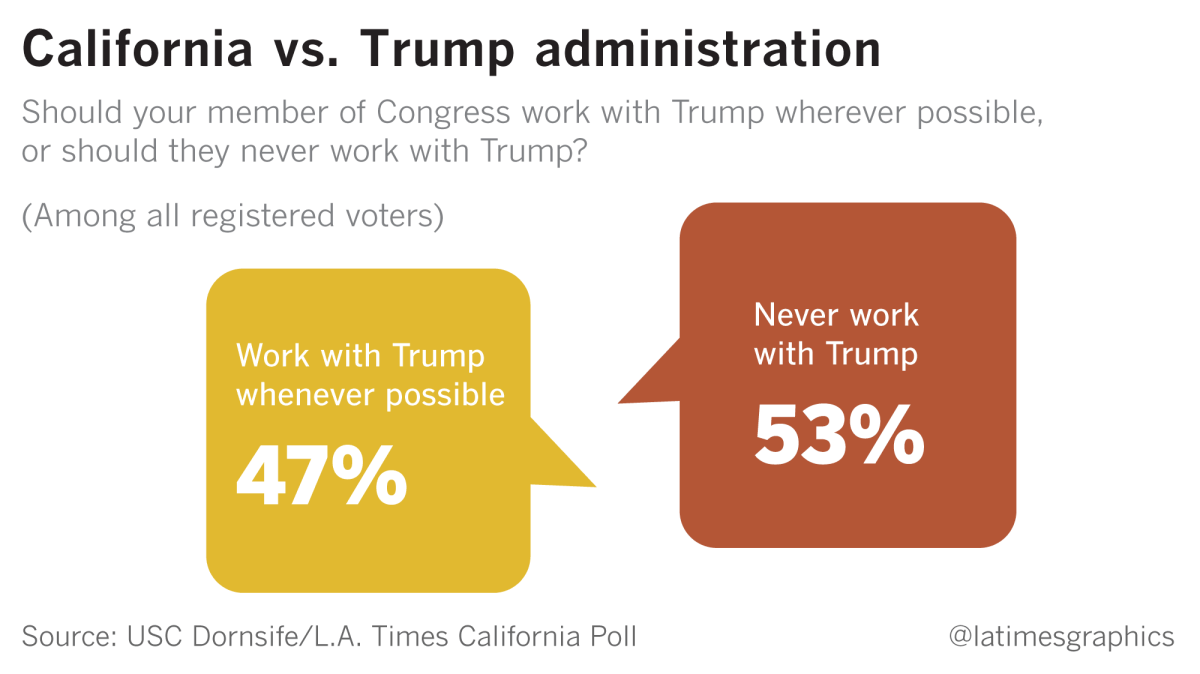Californians strongly oppose Trump ā and 53% say stateās members of Congress should āneverā work with him

Reporting from Washington ā A year after his election, President Trump remains wildly unpopular in California, and the stateās voters are split over whether members of Congress should work with him when possible, a new USC Dornsife/Los Angeles Times poll has found.
The percentage of voters seeking cooperation overall ā 47% ā dropped somewhat when it came to Trumpās immigration policies, which the stateās Democratic officeholders have fought with legislation and lawsuits.
Most California voters praised immigrants and rejected negative characterizations of them that have come from the president and some of his supporters. Eight in 10 said immigrants here without proper documentation were seeking work, not āa handout,ā and that they improve the communities in which they live.
Those sentiments were not shared by the bulk of Republicans, a strong majority of whom remain loyal to Trump. Nearly two-thirds of Republicans said they approved of the job he was doing as president; overall only 22% of California voters gave Trump positive marks as president.
The diversity of views pointed to a continuing truth about California: Under its lopsided support for Democrats in statewide offices rests a state with persistent political schisms.
Voters who are older and white, and who live in inland California, represent the presidentās most loyal supporters here and wanted most for their representatives to work with him. That said, they were more enthusiastic about Trumpās policies than about Trump himself.
Younger and more diverse voters, who have propelled California in one generation from reliably Republican in statewide races to an ocean of political blue, were far harsher in their verdict on Trump and strongly opposed their elected officials cooperating with him.
Among those ages 45 and over, for example, majorities believed that representatives should work with Trump on either immigration or other fronts.
Yet of those under age 35, 62% said elected officials should āneverā cooperate with Trump, and more than 7 in 10 said California should not work with him on immigration.
The USC/Times poll questioned 1,504 Californians, including 1,296 registered voters, online from Oct. 27 through Nov. 6, a year before the 2018 midterm election. The poll has a margin of sampling error of 4 points in either direction for registered voters; larger margins apply to smaller voter groups.
The presidentās unpopularity in California comes as no surprise; he lost the state to Hillary Clinton by more than 30 percentage points. But the poll made clear that he has done nothing to improve his standing since. In fact, it has worsened.
Antipathy toward the president was key to Democratic victories in Tuesdayās general election in multiple states, but it is not clear from the poll whether the sentiment will influence contests here next year. Democrats are fighting for at least seven Republican-held congressional seats in California as part of their effort to take control of the House.
Gov. Jerry Brown, a Democrat, was rated as twice as popular as Trump; the stateās Democratic senators, Dianne Feinstein and Kamala Harris, also were far more popular. Only Congress, perennially dismissed by Californians and now favorably looked upon by 1 in 10 voters, was less popular than the president.
Trumpās positive impression of 20% meant that both his popularity and his job approval rating were substantially lower than the 31.6% of the vote he won in the state last November.
Among the voter groups most inclined to support Trump ā Republicans, white voters and those living in the Central Valley and the Inland Empire ā agreement with Trumpās policies was consistently higher than his popularity or job approval rating. That reflected those votersā backing of Trumpās policy objectives rather than his methods of accomplishing them.
Among Republicans, for example, 59% said they had a positive impression of the president, and 65% supported the job he has done in Washington. Yet 71% said they agreed with his policies.
āEven some people who like his policies probably donāt like his tweeting ā¦ donāt like the sense of creating division and havoc,ā said Robert Shrum, director of the Jesse M. Unruh Institute of Politics at USC, which sponsored the poll.
On the other side of the political divide, however, views of Trump were unrelentingly harsh. Among members of the stateās largest political party, the Democrats, only 4% had a positive view of Trump and only 5% approved of the job he is doing. Eight percent backed his policies.
Latinos, whom Trump has often criticized, were among the most critical of the president. Only 14% gave him positive ratings either personally or for his job, and only 15% backed his policies.
White voters, who make up most of the Republican Party, were more positive, although Trump remained in negative territory. Fewer than 3 in 10 voters approved of him or his handling of the job, and only 34% supported his policies. (The poll did not include enough voters from other racial groups to break them out independently.)
In the polarized political environment, age, too, marked a division. About 1 in 10 under age 35 gave him good marks personally and in his job, and only 15% approved of his policies, contributing to lackluster 26% support across the state for his policies.
Trumpās unpopularity has led to fierce infighting among Democrats about how and whether to cooperate with his administration ā something rarely considered optional during past presidencies.
Amid a range of California voters, the answer was ambivalence.
More than 3 in 5 California voters disagreed with the presidentās policies, but a smaller 53% said elected representatives should never cooperate with Trump.

Almost 9 in 10 Democrats disagreed with Trumpās policies, but 42% of them said members of Congress should try to work with him, compared with 58% who said they should not.
Opposition to working with Trump was fiercest among Latinos, those under 35 and those making less than $50,000 per year. Close to two-thirds of those groups preferred that their representatives stiff-arm the president.
Disagreement followed on the question of whether California officials should cooperate with Trumpās immigration policies.
Overall, only 21% said California should cooperate completely with Trumpās immigration policies, and 19% said California should cooperate most of the time. Sentiment against cooperation was more extreme, with 33% saying the state should never cooperate and 27% saying it should not cooperate most of the time.
For more on politics sign up for our newsletter Ā»
But the responses differed sharply by political affiliation ā 86% of Republicans favored cooperation, while only 16% of Democrats did. Nonpartisan voters were in the middle, with 43% saying cooperation should occur all or most of the time.
Part of the reluctance flowed from the multiethnic makeup of California, where Latinos have become a powerful voting bloc and Asian voters, also often affected by immigration policies, are growing in prominence.
Californians of every demographic description, for example, said that immigrants here without papers had come not for benefits but for work. Even among Republicans, a majority, 57%, said immigrants sought work, while 43% said benefits were their goal. (Immigrants in the country illegally do not qualify for most paid government benefits.)
Only 12% of Latinos thought immigrants came here for benefits, while 25% of white voters, who tend to be older and more conservative, shared that view.
Strong majorities of Californians in many groups defended specific criticisms of immigrants in the country illegally.
Most Californians said immigrants strengthen the economy rather than take jobs that would otherwise be filled by citizens. By almost 2 to 1, Californians also said such immigrants help revitalize their communities rather than increase crime.
Republicans took exception to those views. Almost 3 in 4 said immigrants here illegally take jobs that otherwise would be filled by citizens. And 73% of Republicans said immigrants increase crime rather than serve as a positive in their communities.
Essentially, these GOP voters share views expressed by the president to whom they remain loyal.
āThe people who remain in the party, not just here but around the country, rally around Trump,ā Shrum said.
Twitter: @cathleendecker
ALSO
Full methodology and crosstabs
Itās a tightening race for governor, and Sen. Dianne Feinstein holds strong lead for reelection
Democratic surge in suburbs forecasts a potentially rough 2018 for Republicans
Virginia tests a likely 2018 election strategy: Racially fraught appeals
Coverage of California politics
More to Read
Get the L.A. Times Politics newsletter
Deeply reported insights into legislation, politics and policy from Sacramento, Washington and beyond. In your inbox three times per week.
You may occasionally receive promotional content from the Los Angeles Times.











